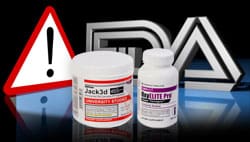
Some manufacturers of DMAA dietary supplements are planning to reformulate their “workout boosters,” after receiving warning letters from the U.S. Food & Drug Administration (FDA) questioning the safety of the supplement ingredient. DMAA, also known as dimethylamylamine, was originally developed as a nasal decongestant, but is now used as an ingredient in “workout boosters” sold […]
 Some manufacturers of DMAA dietary supplements are planning to reformulate their “workout boosters,” after receiving warning letters from the U.S. Food & Drug Administration (FDA) questioning the safety of the supplement ingredient.
Some manufacturers of DMAA dietary supplements are planning to reformulate their “workout boosters,” after receiving warning letters from the U.S. Food & Drug Administration (FDA) questioning the safety of the supplement ingredient.
DMAA, also known as dimethylamylamine, was originally developed as a nasal decongestant, but is now used as an ingredient in “workout boosters” sold under brand names like Lean Efx, Napalm, Nitric Blast and Jack3D. Last Friday, the FDA issued warning letters to 10 manufacturers and distributers of DMAA products, alleging sale of the chemical is illegal. According to the agency, there is no evidence that DMAA deserved to be classified as a dietary supplement.
According to a report from CNBC, some supplement makers have claimed that DMAA is a “natural stimulant” derived from geranium extract, but at least seven studies have failed to show that is the case. In January, the American Herbal Products Association (AHPA), the only national trade association that is focused on herbs and herbal products, informed its members that DMAA should not be labeled as a product of geranium oil.
If supplement makers can’t prove that DMAA is in fact the derivative of the geranium plant, the FDA can halt sales or seize products, CNBC said.
It now appears that some supplement makers that received the FDA letter are turning their backs on DMAA. MuscleMeds, which produces the popular pre-workout supplement, Code Red, pulled the product from its Web site, and a person answering phone for the company has been telling consumers that the product is being reformulated. A Web page for Fahrenheit Nutrition, the maker of Lean EFX, states that DMAA is no longer listed as an ingredient on its label, CNBC said.
Not all sellers of DMAA products are bowing to the FDA. As we reported yesterday, GNC Holdings Inc., the operator of popular GNC health and wellness stores, is disputing the agency’s contention that the ingredient is unsafe. Although GNC did not receive a warning letter from the FDA, it issued a statement on Monday asserting that the FDA has not cited medical or scientific evidence showing that DMAA is unsafe. The company maintains that, when used as directed, DMAA supplements have “the same effect on the body as drinking two cups of coffee.”
DMAA products first attracted scrutiny in December, when the Department of Defense banned sales of DMAA supplements at military base commissaries after the deaths of two soldiers were tied to such products. According to the FDA, DMAA can narrow the blood vessels and arteries, which can elevate blood pressure and may lead to cardiovascular events ranging from shortness of breath and tightening in the chest, to heart attack, according to the agency. Last week, the agency said it had received had received 42 adverse reports on products containing DMAA, including psychiatric disorders and death.
According to CNBC, Health Canada, the drug regulator in that country, banned DMAA last July after finding it was not in fact a dietary supplement and instead was a drug that needed further approval.


